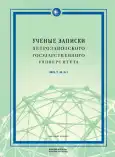RECEPTION OF ARISTOTLE’S “POETICS” IN WORKS OF A. S. PUSHKIN’S LYCEUM TEACHERS
- Authors: Nilova A.Y.1
-
Affiliations:
- Petrozavodsk State University
- Issue: Vol 46, No 1 (2024)
- Pages: 76-81
- Section: Articles
- URL: https://journal-vniispk.ru/2542-1077/article/view/293258
- DOI: https://doi.org/10.15393/uchz.art.2024.994
- ID: 293258
Cite item
Full Text
Abstract
The first half of the 19th century is the period of formation of Russian literary criticism. However, theworks of theorists of significant period are practically not studied. This gap is especially significant when it is associated with teachers who have had a significant impact on the formation of literary concepts of several generations of philologists. The article describes the reception of the main provisions of Aristotle’s “Poetics” – the basis for the European literary theory of literary – in the works of the lyceum teachers N. F. Koshansky and A. I. Galich. It is notedthat Aristotle was an absolute authority for these authors, however, the assimilation of the concept of the Greekphilosopher took place in the context of its interpretation by European aesthetic theories. So Koshansky agrees withAristotle that art gives pleasure and this idea supports the hedonistic theory of catharsis reflected in Koshansky’s work. Schellingian Galich develops the idea of German romanticism about fate as the main force opposing the hero of tragedy, and at the same time defends the classic rule of three unities, which is absent from Aristotle.
About the authors
A. Yu. Nilova
Petrozavodsk State University
Author for correspondence.
Email: nilova@petrsu.ru
Cand. Sc. (Philology)
References
- Annushkin, V. I. N. F. Koshansky – a teacher, a scientist, a rhetorician, a philologist. In: Koshansky, N. F. Rhetoric. (V. I. Annushkin, A. V. Volkov, L. E. Makarova, Eds.). Moscow, 2013. P. 273–286. (In Russ.)
- Annushkin, V. I. About national-cultural performance of Russian philological disciplines. RUDN Journal of Russian and Foreign Languages Research and Teaching. 2018; 16(1): 27–49. doi: 10.22363/2313-2264-2018-16-1-27-49 (In Russ.)
- Annushkin, V. I. “Sober Aristarchus”. N. F. Koshansky – Alexander Pushkin’s philology teacher. Moscow Pushkinist-XI. Moscow, 2005. P. 284–294. (In Russ.)
- Aristotle. Poetics. On the art of poetry. Moscow, 1957. 184 p. (In Russ.)
- Vinogradov, V. V. On the language of literary prose: Selected works. Moscow, 1980. 360 p. (In Russ.)
- Vinogradov, V. V. Essays on the history of the Russian literary language of the XVII–XIX centuries. Moscow, 1982. 528 p. (In Russ.)
- Volkov, A. A. Rhetoric of N. F. Koshansky in the history of the culture of word and thought. In: Koshansky, N. F. Rhetoric. (V. I. Annushkin, A. V. Volkov, L. E. Makarova, Eds.). Moscow, 2013. P. 263–272. (In Russ.)
- Dvoretsky, A. V. The problem of literary genres in Russian criticism “on the eve of Belinsky”. In: Genre and composition of literary works. Historical, literary, and theoretical studies: Interuniversity collection of papers. Petrozavodsk, 1989. P. 22–31. (In Russ.)
- Zakharov, V. N. Problems of historical poetics: Ethnological aspects. Moscow, 2012. 264 p. (In Russ.)
- Kamensky, Z. A. I. A. Galich. Moscow, 1995. 229 p. (In Russ.)
- Lisitsyn, B. B. “Philosophical Empire” of A. I. Galich as a unity of ontology, epistemology, and ethics. In: Social ontology and philosophy of education. St. Petersburg, 2022. P. 96–109. (In Russ.)
- Makarova, L. E. Biography of N. F. Koshansky and his scholarly and pedagogical works. In: Koshansky, N. F. Rhetoric. (V. I. Annushkin, A. V. Volkov, L. E. Makarova, Eds.). Moscow, 2013. P. 287–310. (In Russ.)
- Makarova, L. E. Nikolai Fyodorovich Koshansky (1875 (?) – 1831). Russian Speech. 2013; 1: 82–87. (In Russ.)
- Makarova, L. E. Nikolay Grech’s rhetorical teaching as a tool of text analysis. Bulletin of Kemerovo State University. 2020; 22(4): 1098–1106. (In Russ.)
- Makarova, L. E. Works of N. F. Koshansky. Russian Speech. 2013; 2: 101–110. (In Russ.)
- Makarova, L. E. Works of N. F. Koshansky. Russian Speech. 2013; 3: 93–102. (In Russ.)
- Malchukova, T. G. Ancient and Christian traditions in the poetry of Alexander Pushkin. Book 1. Petrozavodsk, 1997. 196 p. (In Russ.)
- Novosadsky, N. I. Introduction. In: Aristotle. Poetics. Leningrad, 1927. P. 7–37. (In Russ.)
- Potapova, A. M. Hellenistic epigram: translation and reception of the genre in Russian literature of the first third of the 19th century. Russian Language and Culture in the Mirror of Translation. 2021; 1: 357–366. (In Russ.)
- Reznik, N. Galich – Pushkin’s teacher. Higher Education in Russia. 2003; 2: 121–126. (In Russ.)
- Sat, K. A. Stylistic features of “General Rhetoric” of N. F. Koshansky. Vestnik of the North-Eastern Federal University M. K. Ammosov. 2020; 5(79): 99–107. doi: 10.25587/a0752-9719-5534-j (In Russ.)
- Talzi, O. A. Anthropological aspect of the philosophy of Russian romanticism. Pushkin Leningrad State University Journal. 2009; 2(1): 37–43. (In Russ.)
Supplementary files








